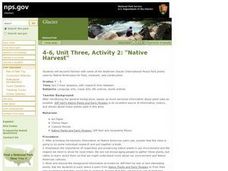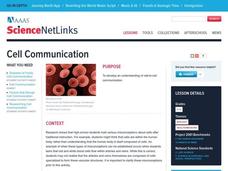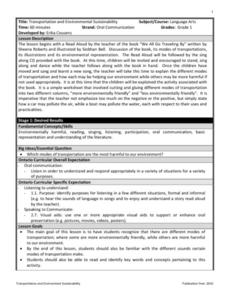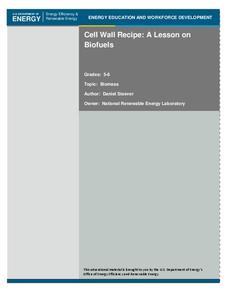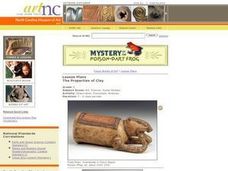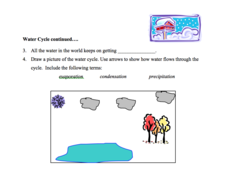California Academy of Science
Color Vision Genetics Evolution Simulation
At one point, all mammals carried only two color receptors, but now most humans carry three. An informative presentation and hands-on activity demonstrate how this evolved through genetics. By participating in the activity, pupils...
Howard Hughes Medical Institute
How Novel Icefish Genes Can Improve Human Health
Designed to accompany the 13-minute video The Making of the Fittest: The Birth and Death of Genes, this handout serves as both a viewing guide during the video and an analysis of how the adaptations of the icefish might help treat some...
PricewaterhouseCoopers
Waste and Recycling: Recycling and Energy Recovery
Reduce, reuse, recycle, and recover. Young environmentalists learn about the overwhelming amount of garbage produced and discover better ways to minimize their impact on Earth by learning the difference between garbage and recyclables.
Curated OER
Fish Communities in the Hudson
Learning to read data tables is an important skill. Use this resource for your third, fourth, or fifth graders. Learners will will study tables of fish collection data to draw conclusions. The data is based on fish environments in the...
Curated OER
Ecosystems and Remote Sensing
Young scholars obtain remote sensing data to compare and contrast global biomass data with global temperature data.
Curated OER
Wild and Wetlands
Upper graders identify the major characteristics of a wetland. They explore the human factors that change a wetland and write a descriptive paragraph about wetlands. This comprehensive lesson also has an interactive "Watershed Game"...
Consortium for Ocean Science Exploration and Engagement (COSEE)
Arctic Smorgasbord
Though the walrus spends roughly one third of its time on land, it eats organisms that live on the bottom of the ocean. The first in a series of five, the lesson uses a variety of plant and animal cards to have scholars build an arctic...
Curated OER
What Is Natural?
Your junior highers will learn about which objects are natural and classify objects as abiotic or biotic. Your class will trace human products to their natural resources using matter cycles and then create their own definition of nature.
Curated OER
Hawaii's Sandy Shores
Investigate Hawaii's sandy shore ecosystem! Start by creating a vocabulary list and having your class complete a KWL chart. Next, pass out the "I think of" sheet. Each learner will then choose a word from a beach bucket and add it to...
Curated OER
Discovering Local Food Chains
Fourth graders study about food chains. With the assistance of a local biologist, Students hike the school trail system. They explore ecosystem and collect data by charting the organisms found and identifying the energy source. They...
Curated OER
Native Harvest
Students read Native Plants and Early Peoples and explore the plants in Waterton-Glacier International Peace Park and find how the Native Americans used them. In this Native American plant and people lesson, students research two types...
Curated OER
Testing for Life’s Molecules
Want to hear a joke about sodium? Na. Young scientists test various materials to identify if they include protein, starch, and glucose by using the Biuret test, iodine starch test, and Benedict's test respectively. After practicing with...
Curated OER
Cell Communication
Students clarify common misconceptions about cells. They assess initial knowledge of cells and cell behavior, read and discuss an article and consider the role of cell communication in the diseases of diabetes, multiple sclerosis and...
Curated OER
Pesticide Watch Card
Students examine human health by identifying dangerous pesticides. In this agriculture lesson, students research the food production system in the United States and discuss dangers such as pesticides, chemicals and insecticides which...
Curated OER
Transportation and Environmental Sustainability
After listening to the book, We All Go Traveling By, 1st graders discuss different modes of transportation that they see out in the world, and the environmental impacts of each one. Kids work together to create a list of the types of...
Captain Planet Foundation
Fall into Healthy Shapes
Kindergartners identify geometric shapes by planting a fall garden. They start their seeds in containers that have different shapes, and keep track of their plants based on those shapes. This brilliantly designed and incredibly thorough...
Curated OER
Cell Wall Recipe: A Lesson on Biofuels
Biotech engineers discover that changes in the DNA code for cell wall formation can help create crops better suited for biofuel production. They extract DNA from wheat germ. They decode paper strips with codes and relate the activity to...
Curated OER
Designing Experiments - Overview
Students explore the concepts that enable them to design and conduct sound scientific experiments. They critique a faulty experiment and become familiar with some of the criteria of a good experiment. They conduct their own experiment.
Curated OER
The Risks of Everyday Living
Students compare their perceptions of risk to the perceptions of scientists and risk professionals. in small groups, they evaluate risks on a scale of 1 to 10 for the average American on a yearly basis.
Curated OER
The Properties of Clay
Sixth graders determine the physical properties of clay by examining ceramic works of art. They evaluate local soil samples for suitability for sculpting and compare clay taken from soil to manufactured clay.
Curated OER
Green Classroom Audit
Students audit their classroom for environmentally friendly practices. For this "green" lesson, students take an inventory of the classroom and identify ways to improve practices. Students complete a worksheet, brainstorm new ideas for...
Forest Foundation
The Web of Life
Producers, herbivores, carnivores, omnivores, decomposers. To begin a study of the forest ecosystem, learners examine the connections among the members of ecological communities.
Curated OER
Harnessing Solar Energy
Middle schoolers discover the properties of light (radiant) energy from the sun by experimenting with solar collectors, cookers, and calculators. After a lecture/demo, students create their own solar collectors and test their efficiency.
Curated OER
Water, Water Everywhere!
Learners brainstorm on ways they use water, and where water comes from. They view video, Down the Drain, to gain specific facts about water use, properties of water, problems of water and the water cycle. They perform a lab activity...
Other popular searches
- Living Environment Science
- Environment Science Labs
- Land Use Environment Science
- Environment Science Dilemma
- Environment Science Graphing
- Environment Science Air
- Environment Science Mcuk
- Environment Science Muck
- Environment Science Vocab
- Science Environment
- Environment Science Hands On
- Science and the Environment












